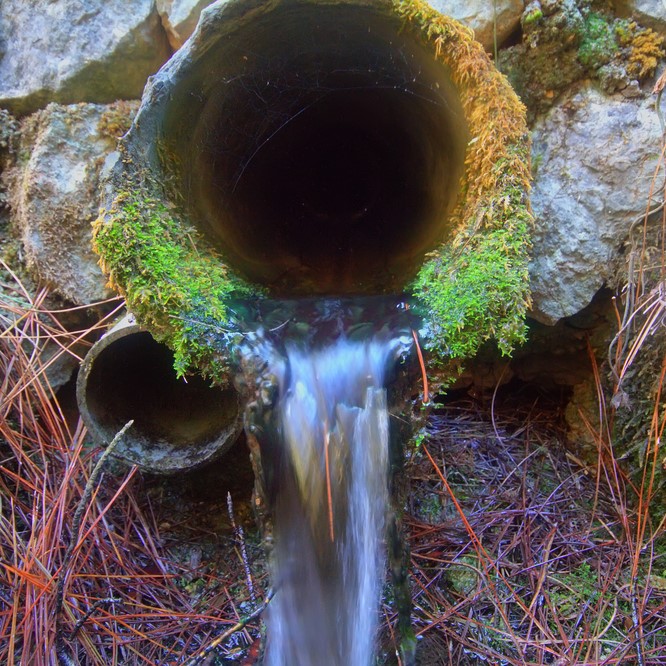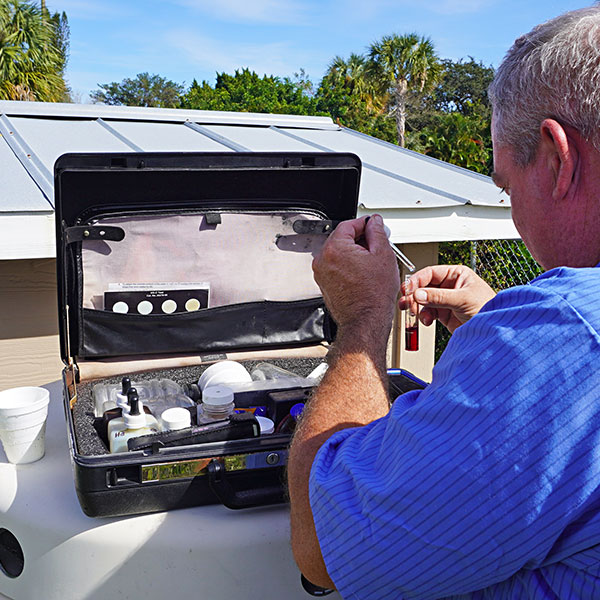Volatile Organic Compounds (VOCs)
Every day, various Florida industries routinely use cleaners, degreasers, herbicides, pesticides, and other commercial products containing volatile organic compounds or VOCs. Millions of Floridians also use household products like paint remover, solvents, and cleaning agents, many of which contain VOCs. Gasoline contains an MTBE (methyl butyl ether) additive, a volatile organic compound that reduces emissions. Volatile organic compounds vaporize into the atmosphere and dissolve in water. In addition to being harmful to the environment, exposure to certain VOCs cause health problems, such as cancer. It can also be harmful to animals and pets.
 VOCs in Groundwater
VOCs in Groundwater
Most volatile organic compounds enter the water supply due to improper waste disposal, underground petroleum storage tanks, and waste runoff that leak VOCs into the soil, groundwater, well water, or surface water. Since some of these contaminants can move from water to air, consumers can be exposed to VOCs through the skin during showering or bathing.
Many consumers use chlorine bleach in their laundry at home, and most water treatment plants use chlorine to disinfect drinking water. Chlorine can produce trihalomethanes (THMs) when it interacts with dissolved organic matter. Since THMs are a suspected carcinogen and have been detected in groundwater, some municipal treatment plants use chloramine as a secondary disinfectant to reduce the presence of THMs in public water.
VOC Contaminants in Florida
In 2006, a U.S. Geological Survey of groundwater and well water found that over 90% of aquifers tested had volatile organic compounds in the water. Florida was among the states with the most frequent detections of groundwater samples.
The Florida Department of Environmental Protection regulates the maximum contaminant level considered safe to consume for 21 VOCs, including Benzene, Dichloroethylene, Styrene, and Trichloroethane.
Is VOCs in Water Safe to Drink?
Although public water systems in Florida are required to ensure chemicals in drinking water does not exceed the maximum contaminant level, trace amounts of chemicals
will still likely be present in tap water. The water could also contain other VOCs that are not yet regulated.
 Removing VOCs in Water
Removing VOCs in Water
Homes and businesses using a private water well should install a water treatment and purification system to remove VOCs in the water to ensure the water is safe for drinking and household use. Homeowners on city water systems can also install a water treatment system to remove any trace amounts of VOCs and other chemicals that may be present in tap water.
Life is better with clean, clear, and healthy water from Atlantic Coast Water Clinic. Our quality water filtration and purification systems remove Volatile Organic Compounds (VOCs) in water for homes and businesses along the Treasure Coast, including Ft. Pierce, Port St. Lucie, Jensen Beach, Lakewood Park, Sebastian, and communities throughout Indian River, St. Lucie, and Martin Counties. Contact a professional, trained water specialist today!
Get a Free Analysis & Quote from Atlantic Coast Water Clinic for any of our solutions. Call (772) 283-4767 or use our online form at the top of the page.


 772-283-4767
772-283-4767